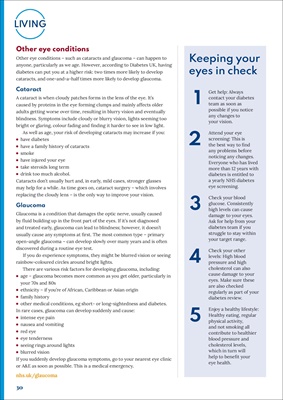
30
LIVING
Other eye conditions
Other eye conditions - such as cataracts and glaucoma - can happen to
anyone, particularly as we age. However, according to Diabetes UK, having
diabetes can put you at a higher risk: two times more likely to develop
cataracts, and one-and-a-half times more likely to develop glaucoma.
Cataract
A cataract is when cloudy patches forms in the lens of the eye. It's
caused by proteins in the eye forming clumps and mainly affects older
adults getting worse over time, resulting in blurry vision and eventually
blindness. Symptoms include cloudy or blurry vision, lights seeming too
bright or glaring, colour fading and finding it harder to see in low light.
As well as age, your risk of developing cataracts may increase if you:
have diabetes
have a family history of cataracts
smoke
have injured your eye
take steroids long term
drink too much alcohol.
Cataracts don't usually hurt and, in early, mild cases, stronger glasses
may help for a while. As time goes on, cataract surgery - which involves
replacing the cloudy lens - is the only way to improve your vision.
Glaucoma
Glaucoma is a condition that damages the optic nerve, usually caused
by fluid building up in the front part of the eyes. If it's not diagnosed
and treated early, glaucoma can lead to blindness; however, it doesn't
usually cause any symptoms at first. The most common type - primary
open-angle glaucoma - can develop slowly over many years and is often
discovered during a routine eye test.
If you do experience symptoms, they might be blurred vision or seeing
rainbow-coloured circles around bright lights.
There are various risk factors for developing glaucoma, including:
age - glaucoma becomes more common as you get older, particularly in
your 70s and 80s
ethnicity - if you're of African, Caribbean or Asian origin
family history
other medical conditions, eg short- or long-sightedness and diabetes.
In rare cases, glaucoma can develop suddenly and cause:
intense eye pain
nausea and vomiting
red eye
eye tenderness
seeing rings around lights
blurred vision
If you suddenly develop glaucoma symptoms, go to your nearest eye clinic
or A&E as soon as possible. This is a medical emergency.
nhs.uk/glaucoma
Keeping your
eyes in check
1 Get help: Always
contact your diabetes
team as soon as
possible if you notice
any changes to
your vision.
2 Attend your eye
screening: This is
the best way to find
any problems before
noticing any changes.
Everyone who has lived
more than 12 years with
diabetes is entitled to
a yearly NHS diabetes
eye screening.
3 Check your blood
glucose. Consistently
high levels can cause
damage to your eyes.
Ask for help from your
diabetes team if you
struggle to stay within
your target range.
4 Check your other
levels: High blood
pressure and high
cholesterol can also
cause damage to your
eyes. Make sure these
are also checked
regularly as part of your
diabetes review.
5 Enjoy a healthy lifestyle:
Healthy eating, regular
physical activity,
and not smoking all
contribute to healthier
blood pressure and
cholesterol levels,
which in turn will
help to benefit your
eye health.